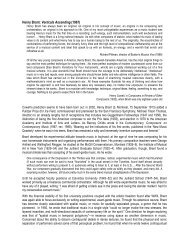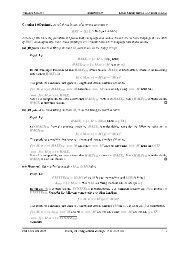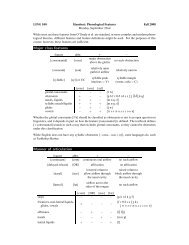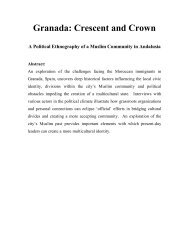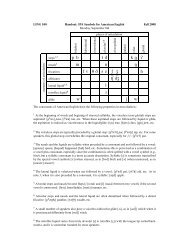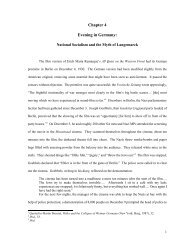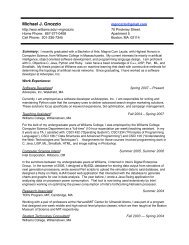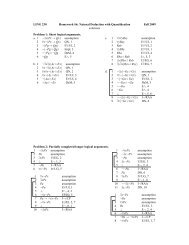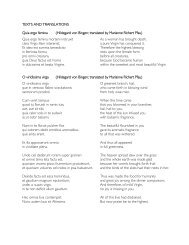Tragedy: A Curious Art Form
Tragedy: A Curious Art Form
Tragedy: A Curious Art Form
You also want an ePaper? Increase the reach of your titles
YUMPU automatically turns print PDFs into web optimized ePapers that Google loves.
PREFACE<br />
<strong>Tragedy</strong>: A <strong>Curious</strong> <strong>Art</strong> <strong>Form</strong><br />
NOTE<br />
Numbers in the margins refer to the lines of the<br />
present translation; numbers at the top right of<br />
the pages to the lines of the original Greek text.<br />
Why does tragedy exist? Because you are full of rage. Why are you<br />
full of rage? Because you are full of grief. Ask a headhunter why<br />
he cuts off human heads. He'll say that rage impels him and rage<br />
is born of grief. The act of severing and tossing away the victim's<br />
head enables him to throwaway the anger of all his bereavements.<br />
I Perhaps you think this does not apply to you. Yet you recall<br />
the day your wife, driving you to your mother's funeral,<br />
turned left instead of right at the intersection and you had to<br />
scream at her so loud other drivers turned to look. When you tore<br />
off her head and threw it out the window they nodded, changed<br />
gears, drove away.<br />
Grief and rage-you need to contain that, to put a frame<br />
around it, where it can play itself out without you or your kin<br />
having to die. There is a theory that watching unbearable stories<br />
about other people lost in grief and rage is good for you-may<br />
cleanse you of your darkness. Do you want to go down to the pits<br />
of yourself all alone? Not much. What if an actor could do it for<br />
you? Isn't that why they are called actors? They act for you. You<br />
sacrifice them to action. And this sacrifice is a mode of deepest intimacy<br />
of you with your own life. Within it you watch [yourself]<br />
act out the present or possible organization of your nature. You<br />
can be aware ofyour own awareness of this nature as you never are<br />
at the moment of experience. The actor, by reiterating you, sacrifices<br />
a moment of his own life in order to give you a story ofyours.<br />
1. Renato Rosaldo, "Griefand the Headhunter's Rage," Text, Play, and Story, edited<br />
by E. M. Bruner (Washington, D.C.: American Ethnological Society, 1984),<br />
pp. 178- 195.<br />
7
Preface<br />
Preface<br />
<strong>Curious</strong> art form, curious artist. Who was Euripides? The best<br />
short answer I've found to this is an essay by B. M.W Knox, who<br />
says of Euripides what the Corinthians (in Thucydides) said of<br />
the Athenians, "that he was born never to live ip peace with himself<br />
and to prevent the rest of mankind from doing so." Knox's essay<br />
is called "Euripides: The Poet As Prophet."2 To be a prophet,<br />
Knox emphasizes, requires living in and looking at the present, at<br />
what is really going on around you. Out of the present the future<br />
is formed. The prophet needs a clear, dry, unshy eye that can<br />
stand aloof from explanation and comfort. Neither will be of interest<br />
to the future.<br />
One thing that was really going on for much of Euripides' lifetime<br />
was war-relatively speaking, world war. The Peloponnesian<br />
War began 431 Be and lasted beyond Euripides' death. It brought<br />
corruption, distortion, decay and despair to society and to individual<br />
hearts. He used myths and legends connected with the<br />
Trojan War to refract his observations of this woe. Not all his<br />
plays are war plays. He was also concerned with people as people-with<br />
what it's like to be a human being in a family, in a fantasy,<br />
in a longing, in a mistake. For this exploration too he used<br />
ancient myth as a lens. Myths are stories about people who become<br />
too big for their lives temporarily, so that they crash into<br />
other lives or brush against gods. In crisis their souls are visible.<br />
To be present when that happens is Euripides' playwriting technique.<br />
His mood, as Walter Benjamin said of Proust's, is "a perfect<br />
chemical curiosity."3<br />
There is in Euripides some kind of learning that is always at<br />
the boiling point. It breaks experiences open and they waste<br />
themselves, run through your fingers. Phrases don't catch them,<br />
theories don't hold them, they have no use. It is a theater of sacrifice<br />
in the true sense. Violence occurs; through violence we are<br />
intimate with some characters onstage in an exorbitant way for a<br />
brief time; that's all it is.<br />
2. Directions in Euripidean Criticism: A Collection of Essays, edited by Peter<br />
Burian (Duke University Press, 1985), pp. 1-12.<br />
3. Walter Benjamin, "The Image of Prousr," Illuminations, edired by Hannah<br />
Arendt, rranslated by Harry Zohn (Schocken, 1968), pp. 203-204.<br />
8<br />
9




